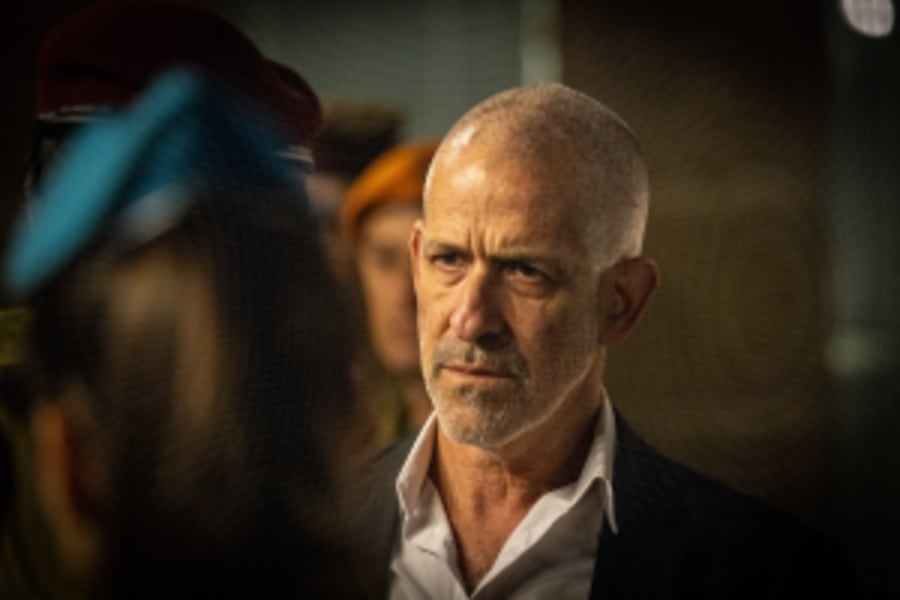Closed borders, new adapted PCR tests and sewage monitoring: Israel's plan to contain Omicron, the new COVID-19 variant
Schools to remain open and, with Hanukkah beginning tonight, events will go on as scheduled, the Cabinet decided

Israel's Corona Cabinet decided late last night to shut the borders to all foreign nationals for at least two weeks in order to avoid an outbreak of the latest COVID-19 strain, Omicron.
Five cases of the new virus have been detected in Israel, at least three of which were found in citizens who recently returned from Malawi.
[Listen to related podcast here.]
State-run coronavirus quarantine facilities have also been revived and all flights to and from Africa have been canceled as the variant was detected in Israelis who traveled from the continent. Israelis cannot travel to 50 African countries without receiving prior permission.
Schools will remain open and, with Hanukkah beginning tonight, events will go on as scheduled without further closures, the Cabinet decided.
"The key here is caution and minimal risks. Until we know more, we want to maintain the great achievement of ours with the Delta strain – an open Israel with a functioning economy and an active education system, with children going to school. This is the highest preference," Israeli Prime Minister Naftali Bennett said.
"To this end we need to maintain tight control of the country's borders. Every day we will learn more and know more. We are ahead of the world in gathering information and in making quick decisions."
The decision, however, is a disaster for the struggling tourism industry which only just picked up recently after the borders were closed to foreigners for more than one year.
This new variant sees Israel going all out. Bennett said on Friday he already purchased about 10 million special and adapted PCR kits for this new variant and plans, like Australia, to begin “a sewage monitoring process of infection across the country, in order to detect morbidity even before the citizen is aware of it.”
He also encouraged parents to vaccinate their children even if it doesn't work against the new strain.
“There is a time for calm and a time for war. Now, we must show responsibility, especially we as a government and you as citizens, to be together, to show mutual responsibility, to be careful, to vaccinate our children," Bennett said. "Get your children vaccinated as soon as possible to increase their level of protection. Even if the variant is less responsive, or partially responsive to vaccines – it’s still worth it. It’s like a flak jacket. Go vaccinate your children today and those who need boosters."
Members of the Corona Cabinet chose to keep their focus on domestic matters, after just having weathered the fourth wave here in Israel. The Cabinet heard from a team of experts and decided that "at this stage the coronavirus vaccine is more important than ever in order to protect the health of the public against severe morbidity," according to a statement from the Prime Minister's Office.
"To this end, the members of the Corona Cabinet call on the citizens of Israel who have yet to be inoculated with the third dose of the vaccine to do so as soon as possible. Parents in Israel are also called on to get their children vaccinated," the statement said.
The vaccine campaign for children ages 5 to 11 began on Tuesday last week.
Here are some more specifics from the Cabinet meeting which ended after midnight on Sunday:
The entry of all foreign nationals to Israel is prohibited, except for cases approved by the exceptions committee.
Israelis defined as either vaccinated or recovered according to Health Ministry procedures, will undergo PCR tests upon arriving in Israel, after which they will enter home quarantine. Subject to undergoing a second PCR test on the third day with a negative result, they will be released from quarantine. Whoever does not undergo an additional test on the third day will be required to complete a full quarantine.
Non-vaccinated Israelis will undergo a PCR test upon landing in Israel, after which they will enter home quarantine. Subject to undergoing a second PCR test on the seventh day with a negative result, they will be released from quarantine. Whoever does not undergo an additional test on the seventh day will be required to complete a full quarantine.
Israelis who return from countries defined as red (the full list has been issued by the information directorate on the fight against the coronavirus) will undergo a PCR test upon landing in Israel after which they will enter quarantine in a designated hotel until the results are received. Upon receiving a negative result, they will transfer to home quarantine and on the seventh day will undergo an additional PCR test. Upon receiving a negative result to the second test, they will be released from quarantine.
The state will inform Israelis departing for overseas that the directives may change while they are abroad and that they will be responsible for adhering to the updated directives upon their return to Israel.
The Finance and Tourism ministries will formulate ways to assist the tourism sector accordingly.
The Israeli Security Agency (ISA) will activate cellphone monitoring in order to track verified cases of the new Omicron strain, locate them and cut the chains of infections.
The Green Pass will apply in closed spaces in which there are gatherings with over 50 participants (as opposed to the current 100).
Performances and activities over the Chanukah holiday will be unchanged, as per the plan that was approved last week, while strictly maintaining the Green Pass rules and implementing increased enforcement.
Watch brief remarks by Prime Minister Bennett at a press conference on Friday.

Nicole Jansezian was the news editor and senior correspondent for ALL ISRAEL NEWS.














